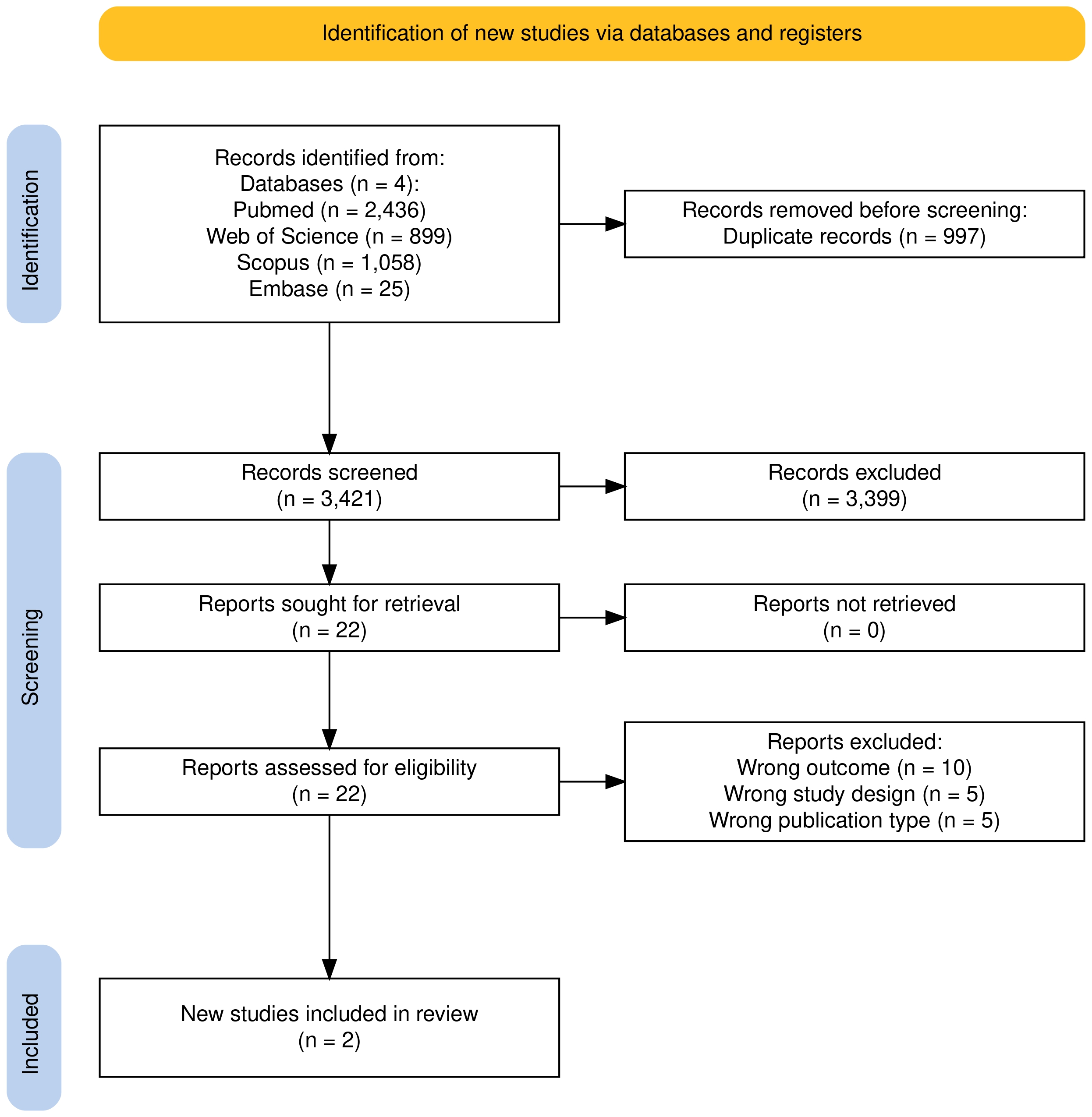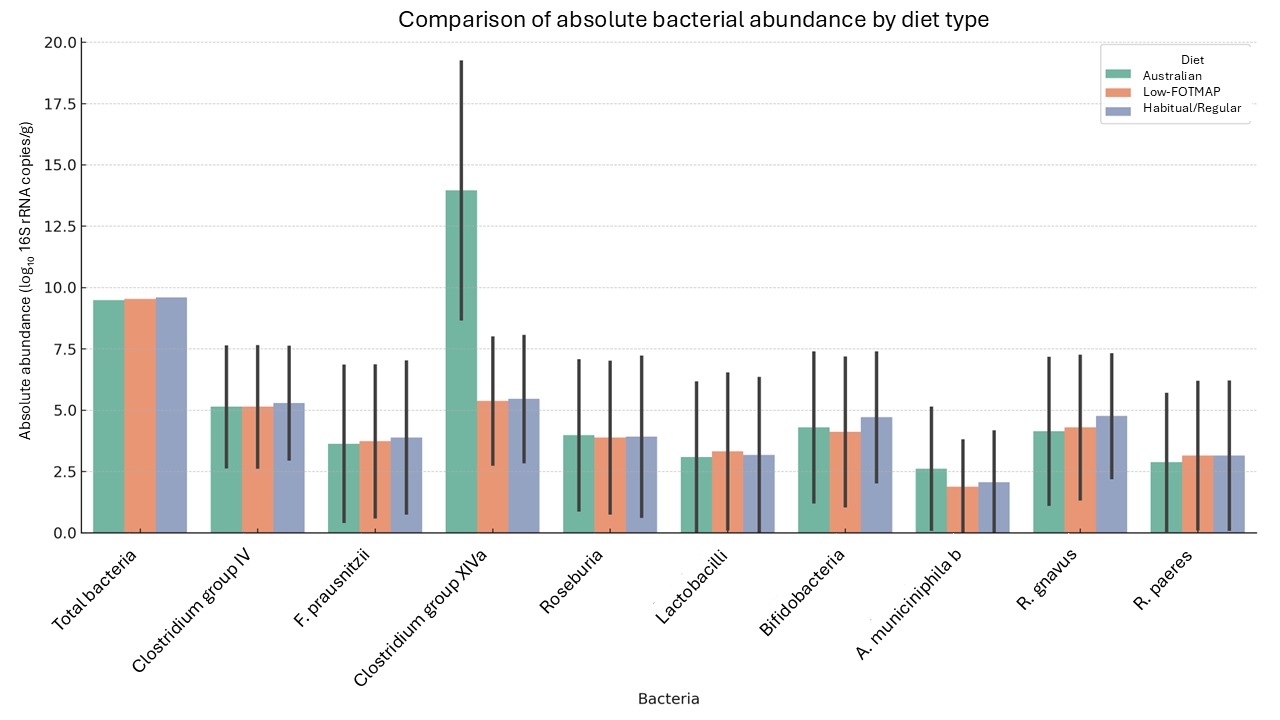Tuesday Poster Session
Category: Infections and Microbiome
P5589 - Effects of a Low FODMAP Diet on Gut Microbiota in Inflammatory Bowel Disease: A Systematic Review
Tuesday, October 28, 2025
10:30 AM - 4:00 PM PDT
Location: Exhibit Hall

Sebastian Arambulo Castillo, MD (he/him/his)
Montefiore Medical Center
Bronx, NY
Presenting Author(s)
Sebastian Arambulo Castillo, MD1, Zhamanda Ortiz Benique, MD2, Nicole Collantes Silva, MD3, Judith Sanchez zavaleta, MD4, Doyler Cubas Garcia, MD5, Carlos Yengle Garcia, MD6, Antony Gonzales Uribe, MD7
1Montefiore Medical Center, Bronx, NY; 2Universidad Nacional de San Agustín de Arequipa, Lima, Lima, Peru; 3University of New Mexico Hospital, Albuquerque, NM; 4UNIVERSIDAD NACIONAL MAYOR DE SAN MARCOS, Lima, Lima, Peru; 5Hospital Nacional Edgardo Rebagliati Martins, Lima, Lima, Peru; 6Universidad Privada Antenor Orrego, Trujillo, La Libertad, Peru; 7NYC Health + Hospitals/Jacobi, Bronx, NY
Introduction: The low FODMAP diet (LFD) is commonly used to alleviate gastrointestinal symptoms in patients with quiescent inflammatory bowel disease (IBD), especially those experiencing irritable bowel syndrome–like symptoms. While its short-term efficacy is well-supported, the diet’s effects on gut microbiota composition remain unclear.
Methods: We conducted a systematic review of randomized controlled trials (RCTs) following PRISMA guidelines. A comprehensive search of PubMed, Embase, Scopus, and Web of Science through March 2025 identified studies involving adults with inflammatory bowel disease (IBD) who underwent a LFD intervention with pre- and post-diet microbiota assessment. Two reviewers independently screened records, extracted data, and assessed risk of bias using the Cochrane RoB-2 tool. Outcomes included microbial composition, short-chain fatty acid (SCFA) levels, gastrointestinal symptoms, inflammatory markers, and quality of life.
Results: Out of 3,421 records screened, two RCTs (n = 61) met inclusion criteria. In Cox et al. (n = 52), 52% of patients on the LFD reported adequate symptom relief compared to 16% in the control group (p = 0.007). Halmos et al. (n = 9) also observed reductions in bloating, flatulence, and abdominal pain. However, both studies showed consistent alterations in gut microbiota. Notably, the LFD was associated with significant reductions in Faecalibacterium prausnitzii (p < 0.038), Bifidobacterium adolescentis (p < 0.003), B. longum (p < 0.005), and Clostridium cluster XIVa (p < 0.008)—key butyrate-producing and immunoregulatory taxa. Akkermansia muciniphila (p < 0.016), critical for mucosal barrier integrity, also declined. Although Ruminococcus torques (p < 0.039), a potentially pathogenic mucus-degrading species, decreased as well, the overall microbial shifts resembled dysbiosis typically seen in active IBD. Fecal SCFA levels were lower in the LFD group, though not significantly. No significant changes were observed in CRP or fecal calprotectin levels.
Discussion: The low FODMAP diet provides effective short-term relief of gastrointestinal symptoms in patients with quiescent IBD. However, it also leads to reductions in beneficial gut microbial taxa and SCFA production, raising concerns regarding its long-term impact. Further long-term RCTs are warranted to evaluate the diet’s influence on disease progression and relapse risk.

Figure: Image N°1: PRISMA flowchart of the randomized controlled trials selection process.

Figure: Figure N°1: Absolute bacterial abundance (log₁₀ copies of the 16S rRNA gene per gram of feces) across three dietary interventions—habitual diet, low FODMAP diet, and typical Australian diet—in patients with quiescent IBD from the study by Halmos et al. Bars represent mean abundance per bacterial taxon; vertical lines indicate standard error. A reduction in beneficial taxa, including Roseburia and Clostridium cluster XIVa, was observed during the low FODMAP diet, suggesting potential adverse microbiota changes with long-term use.
Disclosures:
Sebastian Arambulo Castillo indicated no relevant financial relationships.
Zhamanda Ortiz Benique indicated no relevant financial relationships.
Nicole Collantes Silva indicated no relevant financial relationships.
Judith Sanchez zavaleta indicated no relevant financial relationships.
Doyler Cubas Garcia indicated no relevant financial relationships.
Carlos Yengle Garcia indicated no relevant financial relationships.
Antony Gonzales Uribe indicated no relevant financial relationships.
Sebastian Arambulo Castillo, MD1, Zhamanda Ortiz Benique, MD2, Nicole Collantes Silva, MD3, Judith Sanchez zavaleta, MD4, Doyler Cubas Garcia, MD5, Carlos Yengle Garcia, MD6, Antony Gonzales Uribe, MD7. P5589 - Effects of a Low FODMAP Diet on Gut Microbiota in Inflammatory Bowel Disease: A Systematic Review, ACG 2025 Annual Scientific Meeting Abstracts. Phoenix, AZ: American College of Gastroenterology.
1Montefiore Medical Center, Bronx, NY; 2Universidad Nacional de San Agustín de Arequipa, Lima, Lima, Peru; 3University of New Mexico Hospital, Albuquerque, NM; 4UNIVERSIDAD NACIONAL MAYOR DE SAN MARCOS, Lima, Lima, Peru; 5Hospital Nacional Edgardo Rebagliati Martins, Lima, Lima, Peru; 6Universidad Privada Antenor Orrego, Trujillo, La Libertad, Peru; 7NYC Health + Hospitals/Jacobi, Bronx, NY
Introduction: The low FODMAP diet (LFD) is commonly used to alleviate gastrointestinal symptoms in patients with quiescent inflammatory bowel disease (IBD), especially those experiencing irritable bowel syndrome–like symptoms. While its short-term efficacy is well-supported, the diet’s effects on gut microbiota composition remain unclear.
Methods: We conducted a systematic review of randomized controlled trials (RCTs) following PRISMA guidelines. A comprehensive search of PubMed, Embase, Scopus, and Web of Science through March 2025 identified studies involving adults with inflammatory bowel disease (IBD) who underwent a LFD intervention with pre- and post-diet microbiota assessment. Two reviewers independently screened records, extracted data, and assessed risk of bias using the Cochrane RoB-2 tool. Outcomes included microbial composition, short-chain fatty acid (SCFA) levels, gastrointestinal symptoms, inflammatory markers, and quality of life.
Results: Out of 3,421 records screened, two RCTs (n = 61) met inclusion criteria. In Cox et al. (n = 52), 52% of patients on the LFD reported adequate symptom relief compared to 16% in the control group (p = 0.007). Halmos et al. (n = 9) also observed reductions in bloating, flatulence, and abdominal pain. However, both studies showed consistent alterations in gut microbiota. Notably, the LFD was associated with significant reductions in Faecalibacterium prausnitzii (p < 0.038), Bifidobacterium adolescentis (p < 0.003), B. longum (p < 0.005), and Clostridium cluster XIVa (p < 0.008)—key butyrate-producing and immunoregulatory taxa. Akkermansia muciniphila (p < 0.016), critical for mucosal barrier integrity, also declined. Although Ruminococcus torques (p < 0.039), a potentially pathogenic mucus-degrading species, decreased as well, the overall microbial shifts resembled dysbiosis typically seen in active IBD. Fecal SCFA levels were lower in the LFD group, though not significantly. No significant changes were observed in CRP or fecal calprotectin levels.
Discussion: The low FODMAP diet provides effective short-term relief of gastrointestinal symptoms in patients with quiescent IBD. However, it also leads to reductions in beneficial gut microbial taxa and SCFA production, raising concerns regarding its long-term impact. Further long-term RCTs are warranted to evaluate the diet’s influence on disease progression and relapse risk.

Figure: Image N°1: PRISMA flowchart of the randomized controlled trials selection process.

Figure: Figure N°1: Absolute bacterial abundance (log₁₀ copies of the 16S rRNA gene per gram of feces) across three dietary interventions—habitual diet, low FODMAP diet, and typical Australian diet—in patients with quiescent IBD from the study by Halmos et al. Bars represent mean abundance per bacterial taxon; vertical lines indicate standard error. A reduction in beneficial taxa, including Roseburia and Clostridium cluster XIVa, was observed during the low FODMAP diet, suggesting potential adverse microbiota changes with long-term use.
Disclosures:
Sebastian Arambulo Castillo indicated no relevant financial relationships.
Zhamanda Ortiz Benique indicated no relevant financial relationships.
Nicole Collantes Silva indicated no relevant financial relationships.
Judith Sanchez zavaleta indicated no relevant financial relationships.
Doyler Cubas Garcia indicated no relevant financial relationships.
Carlos Yengle Garcia indicated no relevant financial relationships.
Antony Gonzales Uribe indicated no relevant financial relationships.
Sebastian Arambulo Castillo, MD1, Zhamanda Ortiz Benique, MD2, Nicole Collantes Silva, MD3, Judith Sanchez zavaleta, MD4, Doyler Cubas Garcia, MD5, Carlos Yengle Garcia, MD6, Antony Gonzales Uribe, MD7. P5589 - Effects of a Low FODMAP Diet on Gut Microbiota in Inflammatory Bowel Disease: A Systematic Review, ACG 2025 Annual Scientific Meeting Abstracts. Phoenix, AZ: American College of Gastroenterology.
